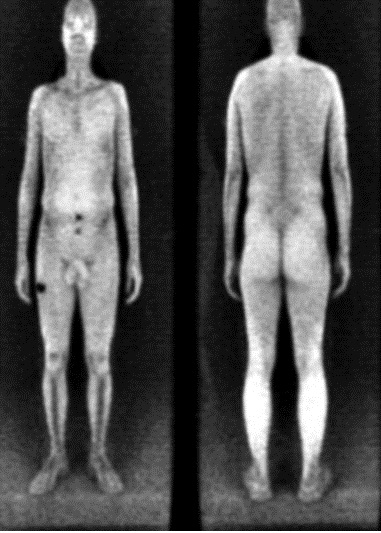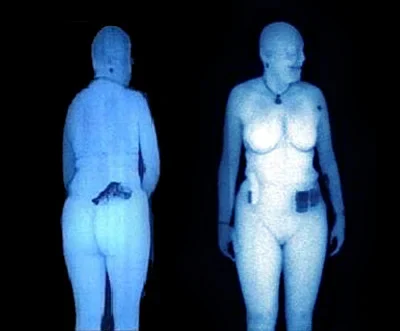Few Adults Support Enhanced Pat Downs, Now Even Full Body Scan Machines in Jeopardy
Some 2 million people fly every day in the U.S. Some are now subject to full body scans or enhanced pat downs. What is the reaction of Americans, particularly frequent flyers, to airport security changes?
In surveys YouGov conducted online last week and this week for Economist magazine, we asked Americans whether they were comfortable or uncomfortable with undergoing a full body scan at an airport security checkpoint. Those interviewed November 20-23, 2010 were simply asked the question. Those interviewed November 27-30 were first shown a photo of the image the body scanner produces. Whether they saw a photo or not, a majority expressed discomfort with the full body scan—55% of those shown no photo, and 60% of those shown a photo, are uncomfortable with undergoing a full body scan.
Only respondents in the November 27-30 survey were shown one of the following two images:


How comfortable are you with undergoing a full body scan at an airport security checkpoint?
| Uncomfortable | Not Uncomfortable | Not sure | |
|---|---|---|---|
Those who did not see photo | 55% | 39% | 6% |
Those who did see photo | 60% | 36% | 4% |
|
|
|
|
Among those shown photo: |
|
|
|
Men | 55% | 41% | 5% |
Women | 64% | 32% | 4% |
|
|
|
|
Heard a lot about airport security changes | 61% | 36% | 3% |
Heard a little | 55% | 41% | 5% |
Not heard about airport security changes | 64% | 27% | 10% |
|
|
|
|
Most frequent flyers* (7+ trips in past year) | 48% | 5% | 2% |
* |
|
|
|
All frequent flyers (3+ trips in past year) | 56% | 43% | 1% |
Infrequent flyers (1 or 2 trips in past year) | 55% | 44% | 1% |
Non-flyers (no trips in past year) | 62% | 32% | 6% |
|
|
|
|
Democrats | 55% | 42% | 3% |
Independents | 60% | 36% | 4% |
Republicans | 67% | 33% | --% |
|
|
|
|
Liberals | 51% | 47% | 2% |
Moderates | 58% | 41% | 2% |
Conservatives | 66% | 32% | 2% |
Discomfort with full body scan among those shown a photo of the image the body scan machine produces
- Women (64% uncomfortable) are much more discomfited than men (55%).
- The most frequent flyers (a small sample of 60 Americans who report having flown 7 or more times in the past 12 months) were the least discomfited (48% uncomfortable, 50% not uncomfortable). Among those who have not flown in the past 12 months, 62% are uncomfortable with the full body scan.
- More than half (56%) of frequent flyers (flew at least 3 times in the past year), and more than half (55%) of infrequent flyers (flew 1-2 times in the past year) are discomfited by full body scans.
- If body scans become a political issue, the political lines have been drawn: Republicans (67% uncomfortable) and conservatives (66%) are much more put off than Democrats (54%) or liberals (51%).
Reps. John Mica, R-Fla. and Rep. Thomas Petri, R-Wis., whose committee assignments will make them leaders in the next Congress on aviation issues, want limits on TSA use of the enhanced pat-downs. Rep. Jason Chaffetz, R-Utah, passed up overtures to join the more powerful House Appropriations Committee recently in order to remain on the House Oversight and Government Reform Committee, where he wrote legislation to ban use of the full body scan machines as the primary screening device at airports.
TSA’s public relations disaster
TSA chief John Pistole recently told the editorial board of USA Today that he launched the controversial new airport full body scans and pat-down searches without first warning travelers, against the advice of his public relations advisers. The predictable result was traveler outrage and what Pistole calls “a media frenzy.” The most damaging element of that public relations error is that TSA missed the opportunity to convince the public, particularly the flying public, that the new procedures increase security.
Overall, do you think the recent changes in air travel security measures will make flying safer or not?
| Won't make a difference | Will make flying safer | Not sure | |
|---|---|---|---|
All adults | 49% | 35% | 16% |
All frequent flyers (3+ trips in past year) | 62% | 31% | 7% |
Infrequent flyers (1-2 trips in past year) | 56% | 36% | 8% |
Non-flyers (no trips in past year) | 43% | 35% | 22% |







